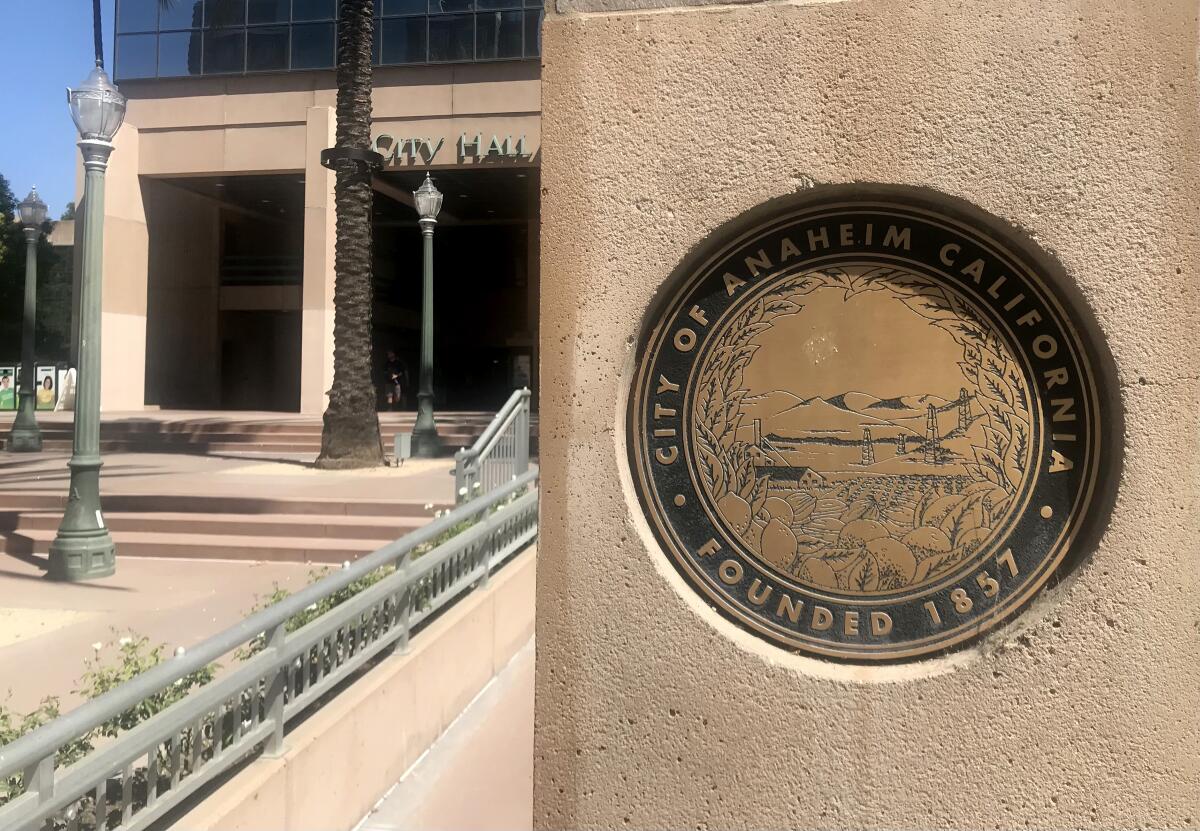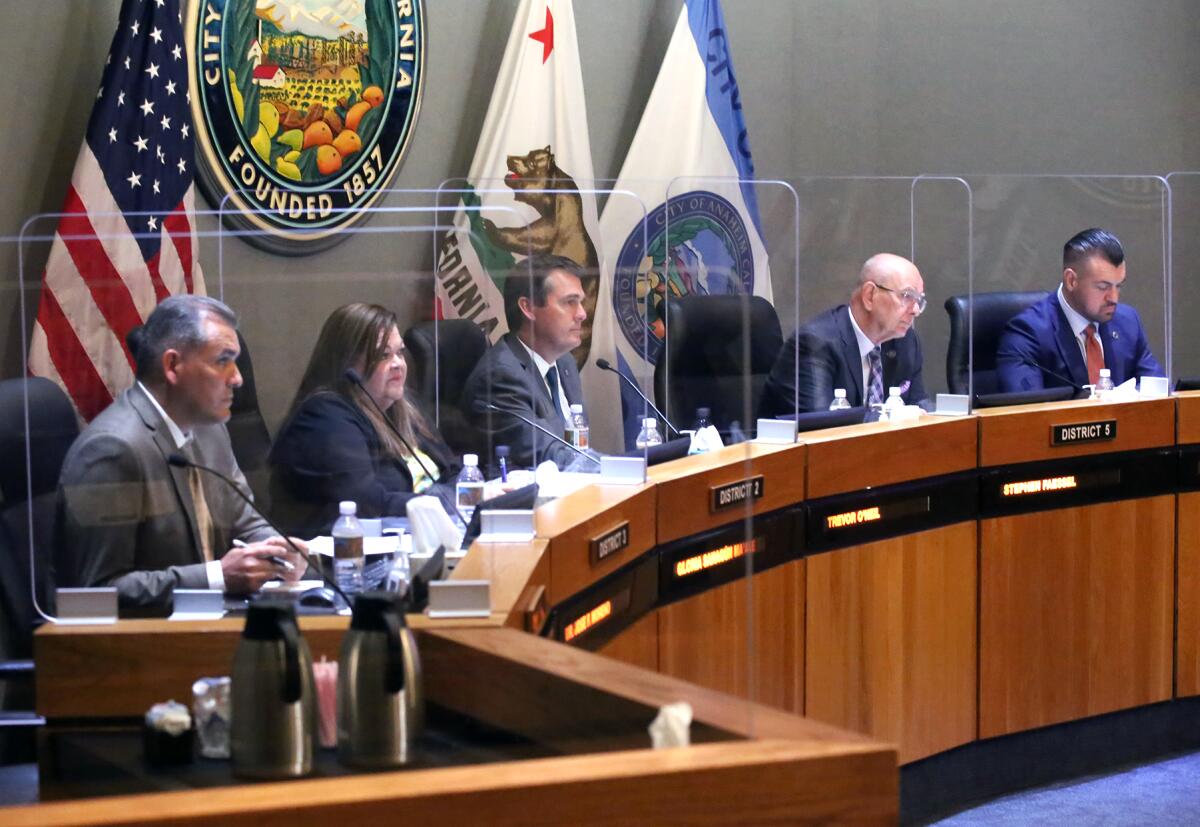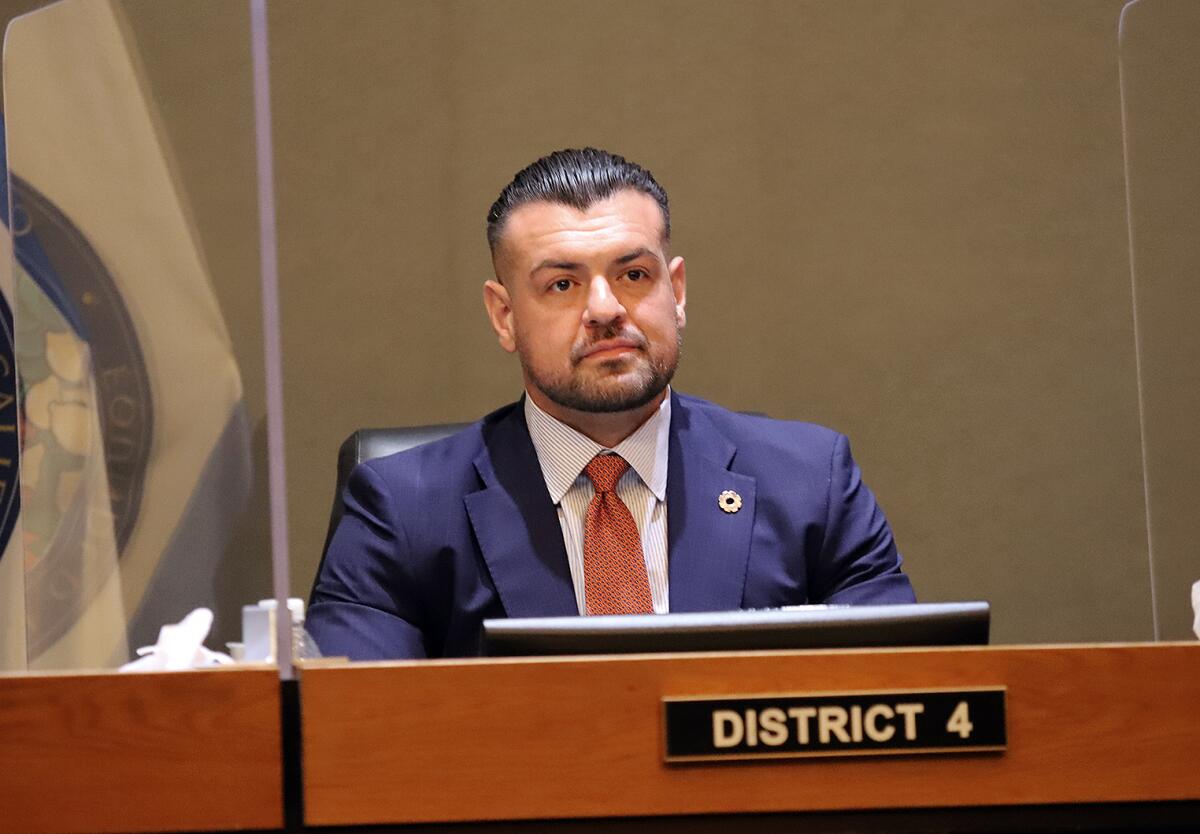Anaheim remains without a mayor following FBI political corruption probe

- Share via
Anaheim City Council, for a second time, failed to fill the vacancy left by former mayor Harry Sidhu, who resigned last month amid an FBI investigation into members of a self-described political ‘cabal.’
During a June 7 meeting, council members first grappled with an array of issues related to the fallout from the probe but couldn’t decide on who to appoint, if anyone, to serve as interim mayor ahead of the November elections.
Two weeks later, the seat remains empty.
In response to public support, Councilman Jose Moreno previously motioned to have himself appointed, a move the rest of the council didn’t support.
This time around, during the June 21 meeting, he nominated a former colleague.
“There is one person that has the trust of a city and that is independent of these interests that are part of the focus of the investigation,” Moreno said. “That would be former mayor Tom Tait.”
Moreno teamed with Tait to form a council majority for two years that was critical of corporate tax breaks. Tait termed out in 2018, but, according to Moreno, he would accept the interim mayor position if appointed.
Moreno was the sole vote in favor of Tait.
Councilman Avelino Valencia followed by nominating Paul Kott, a longtime Anaheim Realtor who has never held elected office. Since 2013, Kott has been a vocal critic of attempts to sell Angel Stadium and 150 acres of land around it.
Valencia was the sole vote in favor of Kott.
“Based off of that exercise, it seems as [if] a consensus is going to be difficult to achieve,” he said.
Valencia raised the question of turning the discussion at a future meeting next to who on the dais should chair council meetings going forward.
Mayor Pro Tem Trevor O’Neil has served in that capacity since Sidhu’s absence and would be positioned to do so if council members failed to appoint an interim mayor by July 23.
An attempt to call for a special election after that time, per the city’s charter, would be “moot” since the mayor’s seat is being contested in November.
Later on in the meeting, Councilman Stephen Faessel asked that the mayoral vacancy come back before the dais for another round of discussions.

While council members failed to appoint an interim mayor, they did discard of a controversial agenda-setting rule that helped define Sidhu’s tenure.
Early on as mayor, Sidhu made sweeping changes to how council meetings were conducted, ostensibly to streamline them. Chief among the reforms was a requirement that a council member needed the support of two colleagues before being able to put an item on an agenda.
Former Councilwoman Denise Barnes and Moreno criticized the policy at the time as nothing more than an attempt to silence their minority voices on the dais.
At the meeting, Moreno wanted to know why O’Neil, who previously voted in favor of the change, now wanted to dispense of it.
“It’s a matter of good governance,” he said, “that those of us who were elected to serve have the opportunity to present items that are of importance to us and to those that we represent.”
Councilman Jose Diaz favored amending the rule to have a council member secure the support of at least one colleague — not two — in order to have an item put on an agenda.
Moreno opposed the move, which ultimately failed, on the grounds that it would still function to stifle his voice, as well as the central Anaheim district he represents, as the lone dissident on the dais.

Valencia argued that since Sidhu’s resignation, agenda items on a host of critical issues have appeared on the agenda. In recent meetings, council members have debated previously stifled matters like Moreno’s push for campaign finance reform, an ordinance that deadlocked during this week’s meeting.
“I don’t think what took place in the past is what’s taking place now,” Valencia said. “There’s been stark differences. Votes and actions matter, not narratives.”
That sparked an exchange between Moreno and Valencia, the two Latino Democrats on the dais.
“It’s pretty clear that District 3 is going to get marginalized in this process unless we bow to the special interests that still control this city,” Moreno said. “No, Councilmember Valencia, actions have not changed.”
Valencia accused Moreno of manipulating narratives in his favor.
In his defense, Valencia noted some key votes away from the previous council majority under Sidhu including opposing increasing the signing authority of the city manager and supporting hazard pay for grocery workers during the pandemic.
“From an individual like yourself who claims to be so righteous, you coming at people with false narratives is extremely frustrating and unethical,” Valencia said. “At the end of the day, like I said earlier, actions and votes are what matter.”
Moreno responded by claiming Valencia admitted that Sidhu had controlled the council majority’s votes, including his own.
After the spat, Valencia and other council members voted 4-2 to allow any one of them to put an item on the agenda without the support of a colleague.
All the latest on Orange County from Orange County.
Get our free TimesOC newsletter.
You may occasionally receive promotional content from the Daily Pilot.






